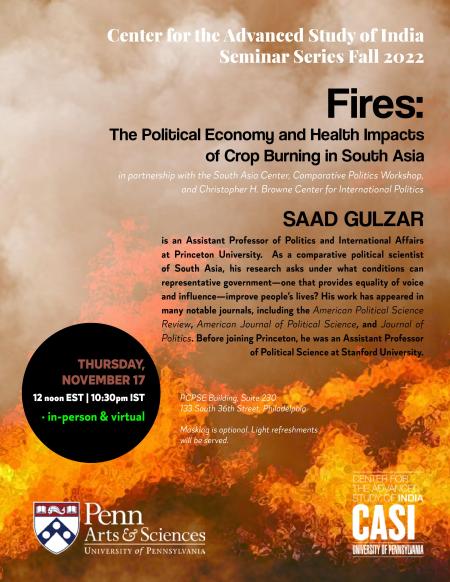Fires: The Political Economy and Health Impacts of Crop Burning in South Asia
Center for the Advanced Study of India
Ronald O. Perelman Center for Political Science & Economics
133 South 36th Street, Suite 230
Philadelphia PA 19104-6215
*Masking is optional*
(English captions & Hindi subtitles available)
About the Seminar:
Air pollution in South Asia is the largest health emergency on the planet, responsible for over 4 million deaths annually. In this seminar, Prof. Gulzar examines the political economy foundations of fighting crop burning, a factor that is said to contribute a third of the experienced pollution in the area. He causally identifies variation in administrators’ incentives to curb pollution, leveraging a decade of wind, fire, and health data from satellites and DHS surveys spanning over 17 million grids in India and Pakistan. He finds that 1) the incidence of fires drops by 10 percent when smoke would affect most of the home district where the fire is located and that 2) this effect is driven by administrators’ capacity and incentives to curb fires. 3) He uses a meteorological model to estimate trajectories of fire particles for a decade, calculate in-utero exposure, and show that fires increase child mortality. His results indicate that administrators’ accountability to their constituents and lack of accountability for the pollution externality they cause to other districts have a substantial impact on crop fires, pollution, and child mortality.
About the Speaker: Saad Gulzar is an Assistant Professor of Politics and International Affairs at Princeton University. As a comparative political scientist of South Asia, his research asks under what conditions can representative government—one that provides equality of voice and influence—improve people’s lives? His work has appeared in many notable journals, including the American Political Science Review, American Journal of Political Science, and Journal of Politics. Before joining Princeton, he was an Assistant Professor of Political Science at Stanford University.
Saad Gulzar is an Assistant Professor of Politics and International Affairs at Princeton University. As a comparative political scientist of South Asia, his research asks under what conditions can representative government—one that provides equality of voice and influence—improve people’s lives? His work has appeared in many notable journals, including the American Political Science Review, American Journal of Political Science, and Journal of Politics. Before joining Princeton, he was an Assistant Professor of Political Science at Stanford University.

